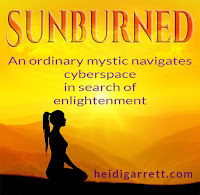The interesting thing is this: As our understanding of the science of the cosmos advances, the reality of a creating, nourishing, and sustaining cosmic force is becoming more and more evident as well. In fact, as we’re advancing, we’re not moving away from the reality of a driving energy or intelligence ordering our world and the universe, we’re sailing directly toward it. Soon, the distinctness between science and spirituality will disappear in a vanishing point. They will become the study of the same thing. Quantum wave theory, the unified field, the vibrational quality of positive and negative emotions, all these things have already been proven to exist.
The question is becoming: How do we let these new understandings impact and transform our lifestyle choices and world views? Father Thomas Keating considers these kinds of questions in a fascinating Buddha at the Gas Pump interview, and his insights are very refreshing. Once the abbot of a Trappist monastery, Keating is an active participant in the Interspiritual movement and an advocate of Centering/contemplative prayer.
When asked to define God:
There are as many ideas of God as there are people; the word is a label and it would would be nicer if we had another word for God; is-ness without any limits; I am-ness without any other pronouns; God has aspects beyond reason; how do you comprehend infinite justice and infinite mercy, you must open your consciousness to a synthesis of the two and transcend a rational concept of god; God is in everything without being limited to anything; dynamic and expanding; God is change itself which is what’s changeless about God.
On an evolving cosmology:
Christian cosmology is patriarchal and limited by the culture it was formed in; it just doesn’t work anymore; theology needs a new cosmology; the dynamic idea of god which evolutionary cosmology has provided in the past 50 years is a revelation of a higher power, one in which we’re immersed and engulfed in, so we don’t have any identity outside of the evolutionary process; creation is not a one-time event; religion has to listen to science because science is giving us up-to-date revelations about who God really is and developing a cosmology that can support union and unity with God.
On consciousness and globalization:
Perhaps we’re at a critical evolutionary level in our time, in which a new general level of consciousness beyond rational is emerging; the capacity to understand reality intuitively may be beginning to happen around the world; the globalization of the world could be an opportunity to allow these insights into reality to be revealed at one time to large numbers of people; insights that can’t be reached on the rational level because the ration level of consciousness is limited.
On Centering Prayer and Contemplation:
Meditation is so important because it’s probably the most direct access to our deeper levels of consciousness; beyond the ego-ic self is a Self that we don’t usually access without something like meditation; by sitting long enough the dust begins to settle, and you begin to see more clearly; the deepest level of consciousness is God consciousness manifested in our uniqueness as a human-being.
Centering prayer can be adapted to any tradition and to someone without a religion; it has been taught in prisons, when other men saw their friends being more calm and peaceful, they ask to attend the classes, then those men begin experiencing more peace and calm, however, you can’t persuade people to do this.
If you’d like to learn more about the specifics of practicing centering prayer/contemplation, listen to the interview (recommended if you’re not Christian) (specific instructions are towards the end of the video), visit Contemplative Outreach, or read Keating’s book, Open Mind Open Heart.
I've embedded the video here for those who would enjoy watching it!












